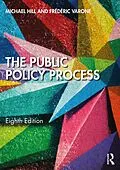The Public Policy Process is essential reading for anyone trying to understand the process by which public policy is made. Explaining clearly the importance of the relationship between theoretical and practical aspects of policymaking, the book gives a thorough overview of the people and organisations involved in the process.
Fully revised and updated for an eighth edition, The Public Policy Process provides:
- Clear exploration, using many illustrations, of how policy is made and implemented;
- Examines challenges to effective policy making in critical areas - such as inequality and climate change - including the influence of powerful interests and the Covid-19 pandemic;
- New material on unequal democracies, interest groups influence, behavioural policy analysis, global policies and evidence-based decision making;
- Additional European and comparative international examples.
This text is essential reading for students of public policy, public administration and management, as well as more broadly highly relevant to related courses in health and nursing, social welfare, environment, development and local government.
Autorentext
Michael Hill is Emeritus Professor of Social Policy at the University of Newcastle, UK. Since leaving Newcastle, he has held visiting appointments in London University, at Goldsmiths College, Queen Mary College and the London School of Economics, and at Brighton University.
Frédéric Varone is Professor of Political Science at the University of Geneva, Switzerland, and an elected member of the Geneva Court of Audit.
Klappentext
The Public Policy Process is essential reading for anyone trying to understand the process by which public policy is made. Explaining clearly the importance of the relationship between theoretical and practical aspects of policymaking, the book gives a thorough overview of the people and organisations involved in the process.
Fully revised and updated for an eighth edition, The Public Policy Process provides:
- Clear exploration, using many illustrations, of how policy is made and implemented;
- Examines challenges to effective policy making in critical areas - such as inequality and climate change - including the influence of powerful interests and the Covid-19 pandemic;
- New material on unequal democracies, interest groups influence, behavioural policy analysis, global policies and evidence-based decision making;
- Additional European and comparative international examples.
This text is essential reading for students of public policy, public administration and management, as well as more broadly highly relevant to related courses in health and nursing, social welfare, environment, development and local government.
Inhalt
Part 1: Policy Theories
1. Studying the policy process
2. Theories of power and the policy process
3. Interests and groups
4. Institutional theory
5. Comparative policy process studies
6. Integrating theoretical approaches
Part 2: Analysis of the Policy Process
7. Policy and politics
8. Agenda setting
9. Policy formulation
10. Implementation: an overview
11. Bureaucracy: organisational structures and processes
12. Discretion, rules and street-level bureaucracy
13. The policy process in the age of governance
14. Conclusion: evaluation and accountability
